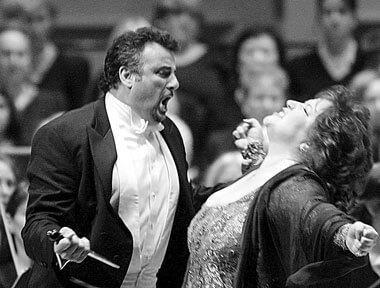Opera Orchestra of New York revives melodramatic “La Gioconda”
What was anticipated––and hoped––to be the Second Coming didn’t quite happen last week. Aprile Millo’s first assumption of the title role in “La Gioconda” at Opera Orchestra of New York (April 20) offered great promise, but not, as yet, revelation.
With operas such as “Tosca” and “Un ballo in maschera” mainstays of her repertoire, Ponchielli’s “La Gioconda” would seem a logical next step for Millo. The soprano’s voice is ample and warm, with a powerful thrust on high Bs and Cs and easy access to chest tone. Her understanding of romantic Italian vocal style is as comprehensive as anyone’s since Renata Scotto, and her declamation of recitative is a model of dramatic expression through song.
However, the very qualities that won Millo so much praise as Adriana Lecouvreur at OONY two years ago––the natural tenderness of the timbre and her vulnerable stage persona––tend to work against her in the more tempestuous role of La Gioconda. In the little first act scena “Tradita! Ahimè!” Millo’s silken legato movingly depicted Gioconda’s heartbreak. But when the drama and vocal line turned vehement in the “Suicidio!” aria, Millo’s burnished gold tone lacked ideal incisiveness: here one wants polished steel. The lurid melodrama of the fourth act also tempted Millo to overindulge her repertoire of stylized gestures at the expense of her usual sincerity.
This is not to say that Millo will not grow into a great Gioconda; in fact, it can hardly be easy to workshop the interpretation of a fiendish role with le tout New York (including Barbara Cook, Placido Domingo, and Matthew Epstein) looking on from a lighted auditorium. And I should note that the audience awarded the diva a thunderous standing ovation at the finish of the opera.
So, yes, Millo’s performance was clearly a success, but the full-scale triumph of the night belonged to tenor Marcello Giordani in the role of Enzo Grimaldo.
We mostly hear Giordani at the Metropolitan in oddball repertoire like “Il pirata” and “Benventuto Cellini,” in parts that emphasize his reliably brilliant top extension. This performance, like his Maurizio in “Adriana” in 2002, demonstrated that the real glory of Giordani’s voice is a rich middle register. The aria “Cielo e mar” fit like a velvet glove, from the suave opening phrases to the rapturous ascent to a ringing B-flat at the finish. And then the audience simply roared its approval, stamping their feet and yelling “bis” (encore) for nearly five minutes.
Giordani is more than just a voice, of course; his musicality and style are on a level with Millo’s. Even in concert, he cuts a dashing and heroic figure on the stage, tall and dark and passionate. It should be noted that the tenor accomplished this performance while recovering from a cold; in fact a representative of OONY appeared at the beginning of the evening to ask the audience’s “understanding.” If ever an artist had no need of indulgence or apology, it was Giordani on this glorious night.
As I am sorry to say we have come to expect from OONY, there was a grave decline in quality from top-billed to featured artists. Both Laura and Barnaba are important leading roles sung by star singers; here we heard competent but undistinguished performances from Milena Kitic and Anooshah Golesorkhi. A few steps lower in quality was bass Luiz-Ottavio Faria (Alvise), a large, ugly voice with only one really good note, a sepulchral low C. Contralto Sheila Nadler’s grisly crash and burn during her aria “Voce di donna” suggested that not even an unprepared and superannuated Elena Obraztsova (originally announced for the role) could have sung it any worse.
The casting of the ilk of Faria and Nadler serves as a sad example of the egregious musical taste of OONY’s conductor, Eve Queler. The evening’s only respite from loud, rhythmically slack orchestral noise was her fussy reading of the superfluous Dance of the Hours. Before then, she managed to flub a crucial cue at the start of the “Anatema” duet, leaving La Millo with major egg on her face.
Across the street from OONY’s Carnegie Hall venue, stronger musical values prevailed in tiny CAMI Hall. On April 22, the Modus Opera offered a promising inaugural production of Mozart’s “Don Giovanni,” remarkable for suave and polished chamber orchestra playing under the baton of Justin Bischof. Among a cast of well-prepared young professional singers, soprano Karen Foster emerged as a standout in the role of Donna Elvira. The attractively cool and instrumental timbre of her voice is reminiscent of the young Karita Mattila, and she negotiated the tricky hurdles of “Mi tradi” with the confident assurance of a diva of tomorrow.
James Jorden is the editor of parterre box, the queer opera zine (parterrebox@aol.com).


































